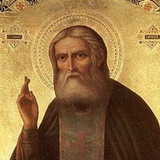Orthodoxie
02 Jan 2024 20:02
@
Читать полностью…
Orthodoxie
02 Jan 2024 18:40
Holy Hieromartyr Ignatius the Godbearer
According to tradition, Saint Ignatius was the little child that Christ held in his arms when He said Whoever humbles himself as this little child is the greatest in the Kingdom of Heaven (Matthew 18:4). Ignatius was a disciple of the Holy Apostle and Evangelist John and became the second Bishop of Antioch. He governed the Church as a good shepherd and was the first to introduce antiphonal chanting with two alternating choirs, a method revealed to him by angels. When the Christ-hating Emperor Trajan passed through Antioch, he offered to make Ignatius a senator if only he would sacrifice to idols. Rejecting the blasphemy, Ignatius was shackled and sent to Rome to be thrown to wild beasts. Rejoicing in his suffering for the Lord, the saint prayed that nothing would interfere with his martyrdom. In the arena, the lions tore him to pieces leaving only his heart, upon which the pagans found inscribed in gold the name: Jesus Christ. Saint Ignatius joined God in the year 107.
Читать полностью…
Orthodoxie
02 Jan 2024 11:24
Saint Jean de Kronstadt
@
Читать полностью…
Orthodoxie
29 Dec 2023 20:25
Prophète Aggé
@
Читать полностью…
Orthodoxie
29 Dec 2023 20:25
Saints martyrs Eustraty, Auxenty, Eugène, Maradary, Oreste
@
Читать полностью…
Orthodoxie
29 Dec 2023 20:24
Saint Daniel le Stylite
@
Читать полностью…
Orthodoxie
29 Dec 2023 20:21
La ville de Ouglitch (Углич).
Le monastère de la Théophanie (Богоявленский монастырь)
@
Читать полностью…
Orthodoxie
29 Dec 2023 14:39
@
Читать полностью…
Orthodoxie
27 Dec 2023 12:18
@
Читать полностью…
Orthodoxie
25 Dec 2023 13:32
@
Читать полностью…
Orthodoxie
24 Dec 2023 18:20
Église de 15ème siècle à Moscou
@
Читать полностью…
Orthodoxie
23 Dec 2023 09:14
Comme les Saints Apôtres, les Saints Pères et les Maîtres de l'Église confessent l'unité et l'unicité de l'Église Orthodoxe avec la sagesse divine des Chérubins et le zèle des Séraphins.
On comprend donc le zèle ardent qui animait les Saints Pères de l'Église dans tous les cas de division et de chute et l'attitude sévère envers les hérésies et les schismes.
À cet égard, les Saints Conciles Œcuméniques et Saints Synodes locaux sont d'une importance primordiale.
Selon leur esprit et leur attitude, sages en ce qui concerne le CHRIST, l'Église est non seulement Une mais aussi unique.
De même que le SEIGNEUR CHRIST ne peut avoir plusieurs corps, IL ne peut avoir plusieurs Églises.
Selon sa nature théanthropique, l'Église est Une et Unique, tout comme le CHRIST HOMME-DIEU est Un et Unique.
Par conséquent, une division, une scission de l'Église est ontologiquement et essentiellement impossible.
☦️
Avec cette citation je suis parfaitement d’accord, même si je n’approuve pas certains choix de la personne qui a produit cette phrase.
Cette citation nous dit, qu’un des signes de l’Eglise est le respect des décisions des Conciles Œcuméniques. Une « juridiction » qui se dit « orthodoxe », mais qui ne respecte pas ces décisions, n’est pas réellement orthodoxe.
Par exemple, Premier Concile Œcuménique a statué à propos du calendrier ecclésiastique : 1 seul calendrier est accepté et c’est le calendrier Julien. Aujourd’hui, plusieurs « juridictions » qui se disent « orthodoxes », utilisent deux calendriers – un pour les fêtes mobiles et l’autre – pour les fêtes fixes. C’est un schisme de nouveaux-calendaristes qui est apparu au début du 20ème siècle.
@
Читать полностью…
Orthodoxie
20 Dec 2023 19:14
@
Читать полностью…
Orthodoxie
20 Dec 2023 19:02
@
Читать полностью…

 288
288